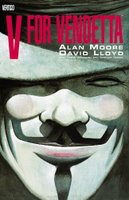In a totalitarian England desolated and isolated from the rest of the world by nuclear war, V is an anarchist who dresses like Guy Fawkes and uses violence to break apart the current regime and remind people that freedom is important. V is an interesting and enigmatic hero/anti-hero. It's never made completely clear if he has any super powers-- he seems to move faster than the police or "fingermen," but it's also pretty clear that the existing regime isn't used to much resistance. One of the great lines, which summarizes the main thrust of the book (and stays with you afterwards), comes near the end when detective Finch finally tracks down V and faces him. V responds: "Did you think to kill me? There's no flesh or blood within this cloak to kill. There's only an idea. Ideas are bullet-proof."
Shortly after finishing the book, I watched the movie (I usually try to read the book first, although this may be the first time I've done so for a comic book movie). It was interesting what they changed-- such as updating the desolation to include biological warfare, making Evey a more appealing character, condensing and combining certain parts of the story (which is obviously necessary for a movie), leaving the many side characters out. Even the portrayal of England is much more clean and comfortable than the dirty, desolate, dark impression I got from the book (conveyed largely by the artwork, although also in the language). I think the totalitarianism in the book is a bit more extreme (for instance, cameras and microphones in every house, on every street), which makes the extremity of V's tactics seem a little more acceptable-- because only something extreme would shake people out of their situation.
The one thing that they carried over unchanged, and that worked perfectly, was the jail sequence-- Natalie Portman did an amazing job with this, but it's also a testament to Alan Moore's writing that this part of the story and the secret letter from the unknown woman prisoner are so effective, and translate so perfectly (unchanged) to the screen. They did, of course, turn V into a bit more of a wise-cracking superhero and added a few big fight sequences (although, really, not as much as you would think the creators of "The Matrix" might). I was a little disappointed that they turned the political situation into a bit more of a mystery and made the dictator clearly evil and responsible for the situation, where in the book morality and culpability is a bit more murky.
The book includes an interesting & entertaining essay by Alan Moore, written sometime during the middle of the series run, about the genesis of V. It also includes two short graphic stories set somewhere within the V story, one of them without any words at all.
| Title: | V for Vendetta |
|---|---|
| Author: | Alan Moore (writer), David Lloyd (artwork) |
| Date published: | 1998 |
| Genre: | Graphic Novel |
| Number of pages: | 286 |



0 comments:
Post a Comment